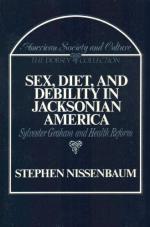|
This section contains 384 words (approx. 2 pages at 300 words per page) |
Encyclopedia of World Biography on Sylvester Graham
Sylvester Graham (1794-1851), American reformer, was a temperance minister and an advocate of healthful living.
Sylvester Graham was born on July 5, 1794, in West Suffield, Conn. His father, a 72-year-old clergyman, died 2 years later. Graham was raised by relatives who gave little attention to his development, and he worked at scattered tasks until he was 19 years old, when he began to cultivate his mind. He became a teacher, but poor health forced him to reconsider his future. He determined to become a minister and entered Amherst College in 1823. There his histrionic manner was scorned by fellow students, and he withdrew from college.
In 1826 Graham married and 3 years later became a Presbyterian minister. He had joined the crusade against drink and in 1830 became an agent of the Pennsylvania Temperance Society. His ardor for the cause led him to study anatomy and to consider the effects of liquor and other substances on the human body. He branched out in his lectures, dealing not only with the evils of drink and gluttony but also with the need for hygienic care of the body. To Graham and his followers the issue was not only health but moral living. His Lecture on Epidemic Diseases Generally and Particularly the Spasmodic Cholera (1833) brought together some of his findings, which eventually led him to prescribe physical exercise, sensible clothing, continence, good sleeping habits, and vegetarianism.
Graham's lectures drew concerned audiences and created both friends and foes. His talks on chastity, though moral in tone and intention, shocked the delicate. His emphasis on a discriminatory diet offended traditions of heavy eating and meat consumption. His advocacy of homemade bread from unbolted wheat, with which his name was ultimately identified (Graham crackers), roused the ire of bakers. Graham's partisans kept Graham boardinghouses and issued Graham's Journal of Health and Longevity (1837-1839). They circulated such works as his Treatise on Bread and Breadmaking (1837) and Lectures on the Science of Human Life (1839).
Graham's vogue faded as suddenly as it had flourished, partly because his disciples divided into parts what he had seen as a grand design. His own increasing emphasis on scriptural authority for personal hygiene failed to attract wide interest. He planned four volumes on the subject but wrote only one before his death on Sept. 11, 1851. Friends completed The Philosophy of Sacred History in 1855.
|
This section contains 384 words (approx. 2 pages at 300 words per page) |


